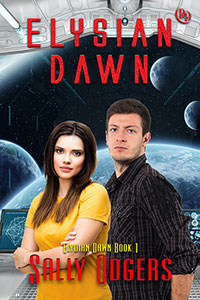Rachel and Harry are planning for the adventure of a lifetime. They are young and in love, and one day they’ll be part of the greatest journey ever undertaken. Until then, they’re busy with all the preparations, tests and technicalities necessary before they go on board the starship Elysian Dawn.
Seventeen elite adventurers, as their employers dub them, enter the simulation. Harry finds them a mixed bunch indeed. He is a physician, but the others range from a teenage acrobat and a midwife to a geologist, and from a vet and a game developer to an expert in ancient history. The one who intrigues Harry is Rachel Traveller, a nutritionist with a peculiar ability she calls clearsight.
As the group work through the challenges of simulation, isolation, and spending time in a stasis-tank, their numbers dwindle until just two of them are left. Now Harry and Rachel prepare for the final challenge, after which they’ll be ready to board the starship.
Meanwhile, the Outward Bound company faces changing times and goalpost challenges, and some of these might have alarming consequences for Harry and his plans.

Greater Southern: 2232
Name: Harry Fejoa
DOB: 25-11-2207
POB: Greater Southern
Ethnicity: Euro-Greater Southern 60%
Qualifications: Physician: specialising in exotic diseases and counselling
N.O.K.: Flavia Neal
After those common-or-garden questions came the rabble. Height-weight-religion-orientation-personality-type
Harry filled them in with his hand on autopilot. His mind was busy asking itself why it had to be done by hand. Had these people never heard of voca-forms? They’d been around for long enough to lose their capital letter and become a generic noun.
Most of what he wrote was true—the checkable stuff, anyway. His qualifications were a matter of record, and the so-called status quo factors were encoded in the chip in his wrist. Anyone could check his veracity on those with a handshake—or a high-five—or even an avuncular pat on the wrist.
Flav might be astonished to find herself tagged as his next-of-kin, but she wouldn’t object. They were third cousins, he thought, and she was the kindest person he knew. She was fifteen years older than Harry, but she had always made time for him when he needed a friend, advice, or anything she could offer, really. She’d been his graduation date, beaming with genuine pride that wee Hazzy—the name she had chosen when he was fourteen and she thought he needed taking down a few pegs—was now Doctor Harry Fejoa. In turn, he was godfather to her only child. He had closer blood-ties than Flav and Harley, but none he cared to acknowledge.
He slid the datasheet into the slot provided and touched his wrist to the screen to verify his identity.
You’ve got an identity-screener. Where’s the voca-form?
After that, he waited.
The room he was in was really more of a cubical. It had a water spigot, a toilet closet, and a small food dispensary. It had nothing for entertainment unless he took up toilet-paper origami.
Harry supposed that was deliberate. He had no doubt someone, whether human or AI or somewhere in between, was monitoring him. That was just mean.
There was no clock and he hadn’t been allowed to bring in any personal electronics, books, paper or writing implements. They’d confiscated his knitting. Fair enough, Harry thought. He’d been pulling their chains on that one.
The stylus would write only on the datasheet, which was now out of reach.
Harry, after an unimpressed once-over of the cubical, put himself into a light trance. Time passed, giving the impression of a time-lapse animation. He watched imaginary clouds speeding through sunsets.
The door opened and a man came in. He had a high-bridged nose, dark eyes, and a mulish mouth. He looked to be at least forty-five, but Harry thought he was almost certainly younger. Some people, in his experience, aged unexpectedly, either looking youthful well into middle age or scowling their way to maturity and beyond when still in their twenties.
Harry didn’t like the anomaly, but he brought himself to full consciousness in less than the snap of his fingers. It wasn’t necessarily the man’s fault he was out of chronological step with himself.
The man sat down on an armed chair facing Harry and looked at him.
Harry looked back.
“So,” the man said, “why would someone like you want to work for Outward Bound?”
Harry said, in italics and with false enthusiasm, “Are you ready for the adventure of a lifetime?” He did jazz hands a couple of times for emphasis and rolled his eyes for effect before his eyebrows went into manic overdrive.
“Ah, so you saw one of our ad-banners.”
“I assumed they were meant to be seen,” Harry said cordially.
“Ye-es.”
“You sound uncertain.”
“Fewer than a quarter of a percent of people have seen one. Most of those who do don’t act on what they see.”
“Subliminal advertising?” Harry suggested.
The man smiled scornfully. “That theory was disproved a long time ago.”
“That doesn’t mean it doesn’t work.”
“It wasn’t subliminal advertising.”
“What, then?”
The man leaned forward, his large, bumpy-knuckled hands clasping the arms of the chair. A sewn badge rippled under the strip lighting and his name briefly flashed to visibility. L. Chavez. “It’s called potentiality. I don’t know the details, but I’m told it’s based on coded patterns that the brains of certain people can unscramble.”
“So, you were looking for someone who could read those words.”
“Not those words. No. Not those particular words. With potentiality, people see—if they see anything—something their brains configure. In short, they see the message they expect—or fear, or want—to see.”
“Expect, in my case,” Harry said.
“Ah?”
“I expected to see a banal baited hook. I didn’t want to and I’m not afraid of anything.”
Chavez looked sceptical. “That’s a rash statement.”
“No, why? Fear is a human response intended to keep us safe. Fear keeps us from jumping off Great Southern Bridge. I’m not afraid because I’m not suicidal. Fear of what I might do means not trusting myself. Fear of what others might do is immaterial. I can’t foresee or control it, so it serves no useful purpose.”
“An interesting point of view.”
“Logical, I’d say. Fear is useful only in as much as it allows us to avoid danger. Mostly, when a man walks into danger it’s due to something he can’t expect or else his own stupidity.”
Chavez leaned forward a bit more. “What did you want to see, Doctor Fejoa?”
“Something interesting.”
Chavez nodded. “I repeat, why would someone like you want to work for Outward Bound?”
“I want to travel, but not without purpose and meaning. I trained as a doctor of the body and mind. I am interested in how human bodies and minds respond to the challenge of the unexpected and the unknowable.” He paused for a beat, and added, “And what do you mean by a person like me?”



